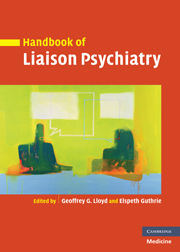Book contents
- Frontmatter
- Contents
- List of contributors
- Preface
- Part I Basic skills
- 1 The development of general hospital psychiatry
- 2 Establishing a service
- 3 Legal and ethical issues in liaison psychiatry
- 4 Understanding psychological reactions to physical illness
- 5 Detection of psychiatric disorders in the general hospital
- 6 The role of the nurse in liaison psychiatry
- Part II Common psychiatric problems across the general hospital
- Part III Working with specific units
- Part IV Treatment
- Part V Different treatment settings
- Index
- References
4 - Understanding psychological reactions to physical illness
from Part I - Basic skills
Published online by Cambridge University Press: 10 December 2009
- Frontmatter
- Contents
- List of contributors
- Preface
- Part I Basic skills
- 1 The development of general hospital psychiatry
- 2 Establishing a service
- 3 Legal and ethical issues in liaison psychiatry
- 4 Understanding psychological reactions to physical illness
- 5 Detection of psychiatric disorders in the general hospital
- 6 The role of the nurse in liaison psychiatry
- Part II Common psychiatric problems across the general hospital
- Part III Working with specific units
- Part IV Treatment
- Part V Different treatment settings
- Index
- References
Summary
People react to illness in a manner that reflects a complex and evolving interaction of several factors. These include their premorbid personality, previous experience of ill health, interpersonal relationships, perceived threat of the illness, the physical treatment required and their interaction with medical and nursing staff to whom they turn for treatment. Most illnesses, except the very trivial, require a period of adjustment and a reappraisal of lifestyle, ability to work and engagement in leisure activities.
Coping strategies
The great majority of people cope constructively with illness in the sense that they seek medical advice appropriately and co-operate with treatment in a manner which maximizes their chances of recovery. If an illness is chronic and associated with permanent disability, lifestyle changes are made which enable a realistic adjustment to take place. Coping is a dynamic process. Most people have a range of coping strategies which they can use flexibly, according to the particular problems that their illness creates at the time. Some cope by involving themselves closely with the treatment plan, seeking out information about their illness not only from their doctor but also from medical textbooks and websites. They may become involved in medical charities devoted to their illness and in the case of rare conditions some become so well informed that they know more about the illness than their doctor.
In sharp contrast to this strategy some people cope by distancing themselves from the emotional implications of their illness.
- Type
- Chapter
- Information
- Handbook of Liaison Psychiatry , pp. 64 - 82Publisher: Cambridge University PressPrint publication year: 2007
References
- 8
- Cited by

